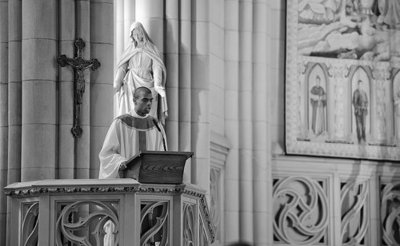A bit fat h/t to Mike “Googling God” Hayes, who is pointing readers to this very good chin-scratcher about what makes for good preaching in the Catholic Church.
From the Pray Tell blog:
In the midst of all the bustle around the introduction of the new translations of the Mass texts, and how they might affect our liturgical practice and experience, I want to make a plea for thinking deeply about the translation that is under local control: the homily. What is the quality of that translation – the moving of the Word out of the Lectionary and into our lives?
Add in that my parish is deep into a process of examination and renewal, where we have said (among other things) that we desire challenging and relevant homilies and I’ve found myself pondering what principles one might apply in crafting a good homily. What moves me?
I want to hear other voices. No, this is not a call for lay homilists at Mass. Instead it is a plea to bring in, explicitly and regularly, voices from our long and rich Catholic tradition. Tell us what John Chrysostom, Augustine, Karl Rahner, Catherine of Siena, Hildegard of Bingen and Dorothy Day thought. What advice did the desert fathers and mothers have that speaks to us now? How might the Rule of St. Benedict make a difference in the lives of those of us who live in the thick of the secular world? What was in that last papal encyclical that we might need to hear? Please, no generic platitudes or ferverinos.
Engage us in dialog. Ask us what we heard in your homily, or didn’t. Last week I asked my 16 year old son what he might have said about the Sunday pericopes (as a weekend sacristan at the parish, he hears 3 of the 4 homilies in a weekend!). His first response was disbelief, “are you asking me what I would have said if I were the priest?” His second was to say that what he heard was a tough challenge to follow Christ , “I would have hit hard on vocations.” None of the homilies sounded quite that note. How can you plant seeds unless you have a sense of the ground in which they might grow?
Do read the rest. Especially if you are someone who spends part of each Sunday in the pulpit, preaching.

